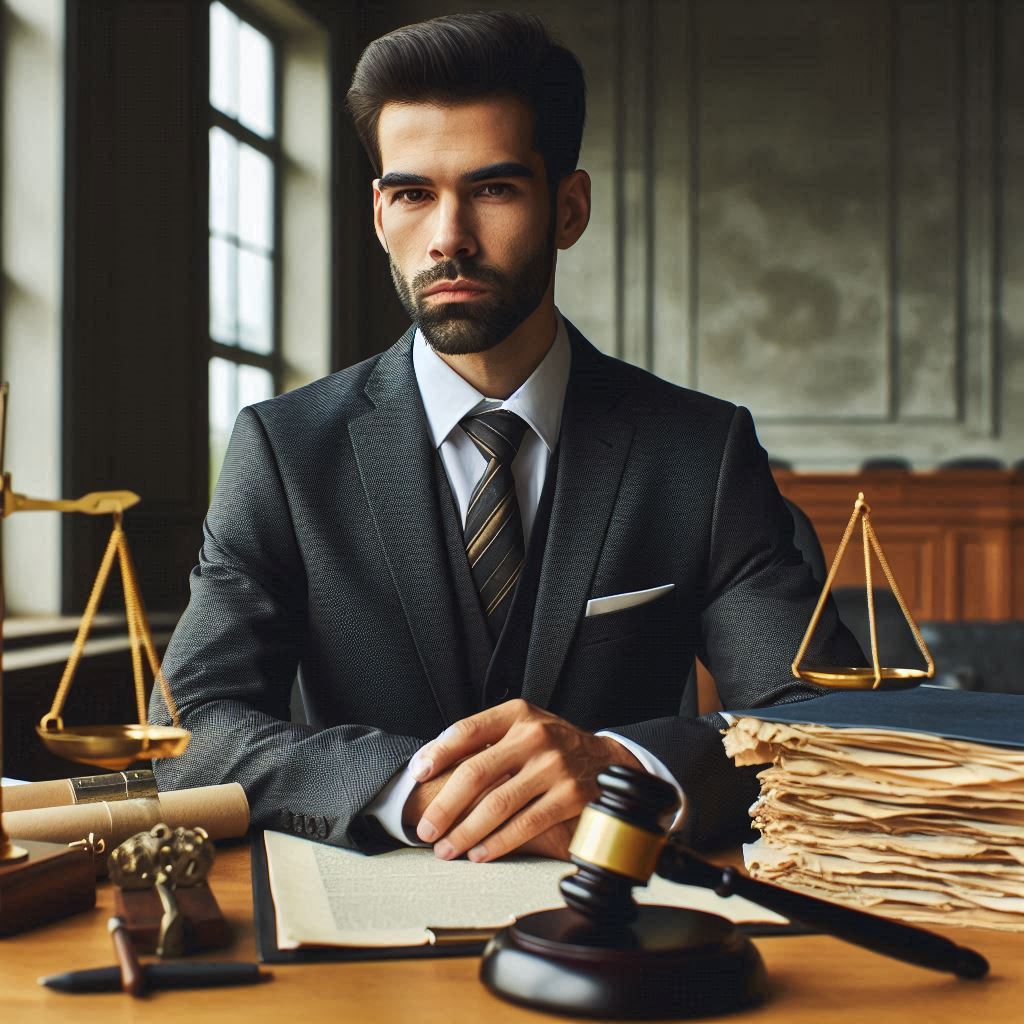Introduction
In the competitive realm of aspiring prosecutors, standing out in interviews is crucial.
The field demands candidates to set themselves apart from others vying for the same positions.
Your interview performance can make all the difference in securing your dream role.
Prepare thoroughly for the interview by researching the prosecuting agency’s work, recent cases, and their mission.
Understanding their goals shows dedication and readiness to contribute effectively.
Emphasize any relevant experience you have, such as internships in prosecution offices or legal clinics.
Discuss specific cases or projects you worked on, demonstrating your practical skills and commitment to the field.
Demonstrate your understanding of legal principles and procedures.
Discuss how you stay updated with current legal trends and case law.
This showcases your commitment to continuous learning and professional development.
Communication Skills
Prosecutors need strong communication skills to present cases persuasively.
Highlight experiences where you effectively communicated complex legal concepts or interacted with diverse stakeholders.
Highlight your commitment to ethical standards in law.
Discuss scenarios where you demonstrated integrity and adherence to legal ethics, ensuring fairness and justice in your work.
Prosecutors face complex legal challenges.
Illustrate your problem-solving skills with examples where you analyzed legal issues, developed strategies, and achieved positive outcomes.
Prosecution often involves teamwork.
Share experiences where you collaborated effectively with colleagues or led initiatives, demonstrating your ability to work in a team environment.
Handle Questions Confidently
Be prepared for challenging questions.
Respond confidently and succinctly, showcasing your knowledge and critical thinking abilities under pressure.
To stand out as an aspiring prosecutor, prepare diligently, demonstrate relevant experience, legal knowledge, communication skills, ethical standards, problem-solving abilities, teamwork, and confidently handle interview questions.
By emphasizing these aspects, you can impress interviewers and increase your chances of securing a position in this competitive field.
Research the Role and Organization
Importance of Researching the Role of a Prosecutor
- Knowing the responsibilities of a prosecutor demonstrates your commitment to the job.
- Understanding the role helps you tailor your answers to showcase your skills effectively.
- Researching the role also gives you insight into the challenges prosecutors face daily.
Importance of Researching the Organization
- Researching the organization gives you an edge over other candidates.
- Understanding the organization’s values helps you align your responses accordingly.
- Knowing the goals of the organization enables you to demonstrate how you can contribute.
Tips on How to Gather Information
- Visit the organization’s website to learn about their mission and values.
- Look for recent cases handled by the organization to understand their focus areas.
- Follow the organization on social media platforms to stay updated on their activities.
- Reach out to current or former employees for insider insights on the organization.
Utilizing Research in the Interview
- Use the information gathered to tailor your responses to align with the organization’s goals.
- Mention specific cases or initiatives of the organization to showcase your knowledge.
- Demonstrate how your skills and experience make you a good fit for the role and organization.
By researching both the role of a prosecutor and the organization where the interview will take place, you show your dedication and readiness to excel in the position.
Use the gathered information to tailor your responses and stand out during the interview process. Good luck!
Read: Top Law Schools for Aspiring Patent Attorneys
Showcase Relevant Experience
Highlighting your relevant experience in law, criminal justice, or prosecution is crucial when applying for a prosecutor position.
This experience demonstrates your understanding of the legal system and your ability to handle complex cases effectively.
Importance of Showcasing Relevant Experience
- Demonstrates your knowledge and understanding of legal procedures and principles.
- Shows your familiarity with the criminal justice system and its intricacies.
- Highlights your ability to analyze evidence, research case law, and prepare legal arguments.
- Illustrates your experience in working with law enforcement, victims, and witnesses.
- Establishes your credibility and competence in handling legal matters professionally.
Tailoring Past Experiences for a Prosecutor Role
When showcasing your past experiences, it’s essential to highlight specific skills and accomplishments that align with the requirements of a prosecutor role. Here are some suggestions on how to tailor your experiences:
- Emphasize any courtroom experience you have, including trials, hearings, or motions you have argued.
- Showcase your ability to conduct legal research, draft legal documents, and analyze case law effectively.
- Highlight any experience you have working with law enforcement agencies or investigating criminal cases.
- Demonstrate your communication skills by showcasing your ability to interact with clients, witnesses, and other legal professionals.
- Show examples of your ability to work under pressure, manage multiple cases simultaneously, and meet tight deadlines.
Tailor your past experiences to demonstrate the skills needed for a prosecutor role. This showcases your suitability and helps you stand out as a strong candidate during the interview.
Remember to provide specific examples and quantify your achievements whenever possible to make a lasting impression on potential employers.
Read: Steps to Become a Registered Patent Agent in the USA
Demonstrate Legal Knowledge
Importance Of Demonstrating A Strong Understanding Of Legal Concepts And Procedures
Aspiring prosecutors aiming to excel in their interviews must effectively demonstrate their legal knowledge.
Highlighting a robust understanding of legal concepts and procedures is paramount.
Here‘s how you can showcase your expertise during your interview:
During the interview, it‘s crucial to emphasize your grasp of legal concepts and procedures.
Showcase your understanding by discussing hypothetical scenarios or case studies.
For example, you could explain how you would approach a complex case involving multiple charges and legal precedents.
Illustrate why a strong foundation in legal knowledge is essential for a prosecutor.
It ensures accurate interpretation of laws and effective advocacy in court.
Your ability to articulate legal principles convincingly will impress interviewers.
Examples of Showcasing Legal Knowledge
Provide concrete examples of how to effectively demonstrate legal knowledge.
Discuss specific cases where your understanding of legal nuances influenced case outcomes positively.
Highlight your role in legal research and case preparation.
Prepare for hypothetical scenarios that test your legal reasoning.
Explain how you would handle evidentiary challenges or procedural issues in a trial.
Demonstrating foresight and analytical skills in such scenarios showcases your readiness for the role.
Analyze relevant case studies during the interview.
Offer insights into how past legal decisions have shaped your approach to prosecuting similar cases.
This demonstrates your ability to apply legal theory to real-world situations.
Practical Application
Connect theoretical legal knowledge with practical application.
Discuss instances where you applied legal principles in internships, clerkships, or mock trials.
Highlight any specific achievements that resulted from your legal acumen.
Express your commitment to continuous learning in the legal field.
Discuss ongoing legal education courses, seminars, or workshops you‘ve attended to stay updated.
This shows your dedication to enhancing your legal expertise.
In a nutshell, standing out as an aspiring prosecutor requires a thorough understanding of legal concepts and procedures.
By demonstrating your legal knowledge through hypothetical scenarios, case studies, and practical examples, you can showcase your readiness for the role.
Prepare diligently and articulate your experiences and insights confidently during your interview.
Read: What Does a Patent Agent Do? Roles and Responsibilities

Prepare for Behavioral Questions
Common Types Of Behavioral Questions Asked In Prosecutor Interviews
One of the key aspects of any prosecutor interview is being prepared to answer behavioral questions.
These types of questions are designed to assess your past behavior and how you handle certain situations.
Here are some common types of behavioral questions asked in prosecutor interviews:
- Conflict Resolution: Be ready to discuss a time when you successfully resolved a conflict in the workplace.
- Leadership: Prepare to talk about a situation where you demonstrated strong leadership skills.
- Problem-Solving: Think of an example where you effectively solved a complex problem.
- Decision-Making: Be ready to explain how you made a difficult decision and the outcome.
- Teamwork: Discuss a project where you collaborated well with a team to achieve a common goal.
In order to prepare concise and compelling answers to these questions, follow these tips:
Tips On How To Prepare Concise And Compelling Answers That Showcase Skills, Qualifications, And Values
When answering behavioral questions, it’s important to provide specific examples from your past experiences.
Avoid generalizations and focus on the details of the situation, your actions, and the outcomes.
Choose examples that highlight skills relevant to the role of a prosecutor, such as critical thinking, attention to detail, communication, and problem-solving.
Tailor your responses to demonstrate how these skills make you a strong candidate.
The STAR method is a useful framework for structuring your responses to behavioral questions.
Describe the Situation, Task, Action, and Result of the scenario you are discussing to provide a clear and organized answer.
Avoid exaggerating or fabricating examples in your responses.
Interviewers can usually tell when a candidate is being insincere.
Be honest about your experiences and showcase your true self during the interview.
By preparing thoughtful and well-structured responses to behavioral questions, you can effectively showcase your skills, qualifications, and values to stand out in a prosecutor interview.
Transform Your Career Today
Unlock a personalized career strategy that drives real results. Get tailored advice and a roadmap designed just for you.
Start NowRead: Patent Agent Certification: Everything You Need to Know
Highlight Soft Skills
When applying for a prosecutor position, it’s crucial to emphasize your soft skills.
These skills are essential for success in this role and can set you apart from other candidates. Here are a few tips on how to highlight your soft skills effectively:
Importance Of Highlighting Soft Skills Such As Communication, Critical Thinking, And Problem-Solving
Soft skills such as communication, critical thinking, and problem-solving are vital for prosecutors.
Prosecutors need to be able to communicate effectively with a variety of people, including victims, witnesses, and jurors.
They must also be able to think critically and solve complex problems in order to build a strong case.
Examples Of How To Demonstrate These Skills Through Past Experiences Or Through Hypothetical Situations
One way to demonstrate your soft skills is by providing examples from past experiences.
For instance, you could talk about a time when your strong communication skills helped resolve a conflict or when your problem-solving abilities led to a successful outcome.
These examples can showcase your capabilities and demonstrate how you would excel as a prosecutor.
Another way to showcase your soft skills is by describing how you would handle hypothetical situations.
For example, you could discuss how you would approach a challenging case or how you would communicate with a difficult witness.
By outlining your thought process in these scenarios, you can give potential employers insight into your problem-solving and communication skills.
Overall, highlighting your soft skills is essential for aspiring prosecutors.
By emphasizing your communication, critical thinking, and problem-solving abilities, you can demonstrate your readiness for the challenges of this role and stand out as a top candidate.
Delve into the Subject: The Impact of Arbitration on Contract Disputes
Dress and Act Professionally
The Significance of Professional Presentation
Presenting oneself professionally during an interview is crucial for aspiring prosecutors.
It reflects your seriousness about the role and your respect for the interviewers.
A professional appearance can set the tone for the entire interview, showcasing your commitment to the legal field.
It also demonstrates your understanding of the courtroom environment, where professionalism is paramount.
Choosing the right attire is essential for creating a positive first impression.
For men, a well-fitted suit in neutral colors like navy, black, or gray is ideal.
Pair it with a crisp white or light-colored shirt and a conservative tie.
Ensure your shoes are polished and match your belt.
For women, a tailored suit or a professional dress in neutral colors is appropriate.
Avoid overly bright colors or flashy accessories.
Closed-toe shoes and minimal jewelry complete a professional look.
Both men and women should ensure their clothes are clean, pressed, and well-fitted.
The Importance of Body Language
Body language plays a significant role in how you are perceived during an interview.
Maintain good posture by sitting up straight and keeping your shoulders back.
Avoid slouching or leaning too far back, as it can convey disinterest or laziness.
Make eye contact with your interviewers to show confidence and engagement.
However, avoid staring, which can make people uncomfortable.
Use hand gestures sparingly to emphasize points, but don’t overdo it, as excessive gesturing can be distracting.
Nod occasionally to show you are listening and understanding the conversation.
Your communication style is equally important in leaving a positive impression.
Speak clearly and confidently, but avoid being overly aggressive.
Use a moderate pace and volume, ensuring your voice is neither too loud nor too soft.
Be concise and articulate in your responses, avoiding long-winded answers.
Practice active listening by not interrupting the interviewers and responding thoughtfully to their questions.
Show enthusiasm for the role and the organization, but remain professional and composed.
Tips for a Positive Impression
In addition to attire and body language, several other factors contribute to a positive impression.
Arrive early to the interview to show punctuality and respect for the interviewers’ time.
Bring multiple copies of your resume, a notepad, and a pen.
This shows you are prepared and organized.
Turn off your phone or leave it in your car to avoid any interruptions.
Greet your interviewers with a firm handshake and a friendly smile.
Use their names during the conversation to build rapport.
Thank them for the opportunity at the end of the interview, and follow up with a thank-you email to reiterate your interest in the position.
In essence, dressing and acting professionally are critical components of a successful interview for aspiring prosecutors.
Your appearance, body language, and communication style all contribute to the impression you leave on your interviewers.
By paying attention to these details, you can set yourself apart and increase your chances of securing the role.
Conclusion
Thoroughly research the office where you are interviewing.
Understand its mission, recent cases, and notable achievements.
Know the office’s priorities and values.
This knowledge shows your genuine interest and preparedness.
Be ready to discuss every aspect of your resume in detail.
Highlight relevant experiences, such as internships or clerkships.
Explain how each experience has prepared you for a prosecutor’s role.
Be specific about your accomplishments and the skills you gained.
Be well-versed in key legal concepts and recent legal developments.
Prosecutors must have a strong grasp of the law.
Review major cases and legal trends.
This will demonstrate your legal acumen and commitment to staying informed.
Interviewers often use behavioral questions to assess your suitability.
Practice responses to questions about ethical dilemmas, teamwork, and conflict resolution.
Use the STAR method (Situation, Task, Action, Result) to structure your answers.
This method helps you provide clear and concise responses.
Demonstrate Your Passion
Show your passion for public service and justice.
Explain why you chose to pursue a career as a prosecutor.
Share any personal experiences that inspired you.
Passion can set you apart from other candidates.
Highlight specific skills that are crucial for prosecutors.
Discuss your research, analytical, and public speaking abilities.
Provide examples of when you effectively used these skills.
Emphasize your ability to handle a heavy caseload and work under pressure.
Participate in mock interviews to practice your responses.
Ask mentors or colleagues to simulate the interview process.
Feedback from these sessions can help you refine your answers and improve your confidence.
First impressions matter.
Dress professionally for your interview.
A polished appearance conveys seriousness and respect for the position.
Ensure your attire is conservative and appropriate for a legal setting.
Prepare thoughtful questions to ask the interviewers.
Inquire about the office culture, expectations, and recent challenges.
Insightful questions show your engagement and interest in the role.
They also help you determine if the office is a good fit for you.
Follow Up
Send a thank-you email after your interview.
Express your appreciation for the opportunity to interview.
Reiterate your interest in the position and the office.
A follow-up note demonstrates professionalism and reinforces your enthusiasm.
In closing, aspiring prosecutors should research the office, know their resume, understand legal concepts, and prepare for behavioral questions.
Demonstrate your passion, showcase relevant skills, and participate in mock interviews.
Dress professionally, ask insightful questions, and follow up after the interview.
Diligent preparation and confidence can help you stand out amongst other candidates.
With these tips, you can make a strong impression and move closer to your goal of becoming a prosecutor.
[E-Books for Sale]
The Big Book of 500 High-Paying Jobs in America: Unlock Your Earning Potential
$19.99 • 500 High-Paying Jobs • 330 pages
Explore 500 high-paying jobs in America and learn how to boost your career, earn more, and achieve success!
See All 500 High-Paying Jobs of this E-Book
1001 Professions Without a Degree: High-Paying American Jobs You Can Start Now
$19.99 • 1001 Professions Without a Degree • 174 pages
Discover 1001 high-paying jobs without a degree! Unlock career tips, skills, and success strategies for just $19.99!




